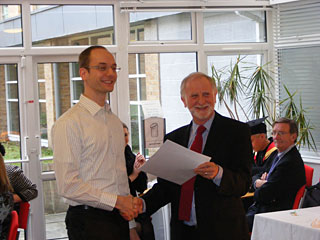[The following is an English version of the article ‘MBA in Europa: Die Mischung macht’s‘ that appeared as an op-ed in the MBA supplement of the Frankfurter Allgemeine Zeitung (FAZ) on October 29th, 2009.]
Without a doubt, every MBA applicant needs an excellent GMAT score, a flawless academic record and a unique quality to stand out from the crowd, but social competence is what a potential applicant needs to have to be a winner to complete a MBA program, land a dream job and conquer the business world.
For the past several years, the secret has no longer lied in grades and academic awards but rather in a mix of different mental, personal and even physical strengths. From my teaching experience at the Lancaster University Management School (LUMS), I have learned that the GMAT is a strong indicator for the future academic success of a student, especially if the course in question is heavy on the quantitative side. This is, however, only half the battle.
Well-known MBA critic Henry Mintzberg strongly believes that no student can become a successful manager by just attending lectures. The difference between mere theory and actual practice of management implies that a student cannot learn what it takes to handle the challenges of a manager position without actually taking part in a production or service creation related job themselves. While case studies are in theory useful to get a feel for the daily life of a manager, they also undermine the importance of real-life work experience. The fact is that co-workers and subordinates aren’t just a set of data, but complex individuals who require more than analysis and strategies to be led effectively.
In a sense, this can already be seen during a MBA program where complex projects can only be completed successfully by a team, not just a strong individual. It is not about commenting on and controlling the work of others, but using them for guidance and stimulus. The students who are the most successful can identify the complementary skills of others and are able to motivate them to participate. A good MBA student can be paired up with the weakest team members and still deliver the best project, simply because he or she knows how to effectively lead a team. Authentic enthusiasm and positive attitudes help successful MBA students, and eventual managers, not only to utilize their laborers but to pass their ambitions on to others. By doing so, they create a healthier and more efficient working environment in which common goals and the well-being of the organization are highly valued.
Therefore, social competence is a must for top managers. Business schools are incorporating such components into their programs to enable students to gain this needed skill. At LUMS, we have added three consulting projects to our MBA program, and two of them must be completed in randomly assigned teams. After the projects, many students report that they have been a true highlight of the program, and one of the program’s aspects from which they have learned the most. The idea was developed after the success of International Master in Practicing Management (IMPM), a program for senior managers co-developed with Henry Mintzberg in response to his own criticism of existing programs and offered by LUMS in cooperation with McGill, INSEAD, and a few other partner institutions.
While there are MBA programs that attempt to integrate practical learning experience into the curriculum, the social management skills should already play a role in the admissions process. It is certainly not an easy task, since character can’t be easily evaluated in a short time period. Assessment centers simply cost too much. There have been rumors, however, that GMAC is working on a new version of the GMAT which will also test social components and time management skills, although nothing has been made official yet. It will still be the admissions office’s task to make sure that the right candidates are accepted.
However, one needs to be aware that this argument is often misused as well. A solid, quantitative understanding is still vital for every top managerial position and can not be replaced. But just alone, it is not enough. MBA programs that do not require applicants to take the GMAT, and instead claim it is sufficient to interview potential applicants, must be dealt with carefully. These programs are often more afraid about the external evaluation of its students, like the average GMAT score of their incoming class, than the social character skills of their candidates. These admission interviews often resemble sales pitches to the students. Because applicants also learn a great deal from fellow students, they should pay careful attention in such cases and research the student body of the institution they consider to join.
Altogether the MBA student needs excellent qualities in both academic and character-related areas for ultimate success during and after the MBA program. Just as in most other aspects of life, it’s in the mix.
Dr. Joern Meissner is a Lecturer in Management Science at the Lancaster University Management School in England and founder of the educational institutions Manhattan Review and Lancaster Executive.
![[Slashdot]](http://www.meiss.com/blog/wp-content/plugins/slashdigglicious/icons/slashdot.png)
![[Digg]](http://www.meiss.com/blog/wp-content/plugins/slashdigglicious/icons/digg.png)
![[Reddit]](http://www.meiss.com/blog/wp-content/plugins/slashdigglicious/icons/reddit.png)
![[del.icio.us]](http://www.meiss.com/blog/wp-content/plugins/slashdigglicious/icons/delicious.png)
![[Facebook]](http://www.meiss.com/blog/wp-content/plugins/slashdigglicious/icons/facebook.png)
![[Technorati]](http://www.meiss.com/blog/wp-content/plugins/slashdigglicious/icons/technorati.png)
![[Google]](http://www.meiss.com/blog/wp-content/plugins/slashdigglicious/icons/google.png)
![[StumbleUpon]](http://www.meiss.com/blog/wp-content/plugins/slashdigglicious/icons/stumbleupon.png)
![]() December 9th, 2010 by
December 9th, 2010 by  Joern Meissner
Joern Meissner 
